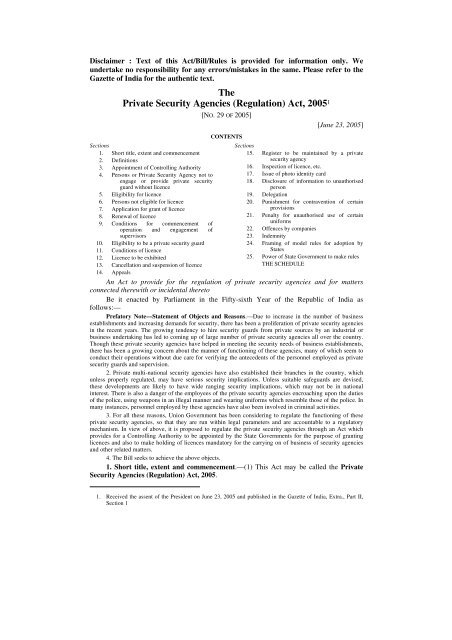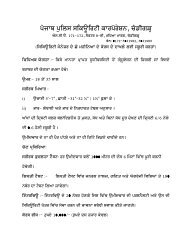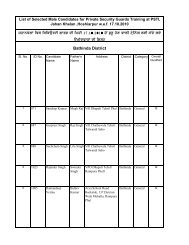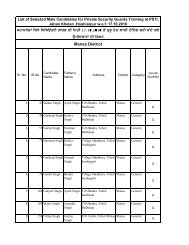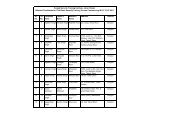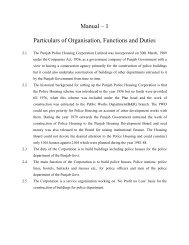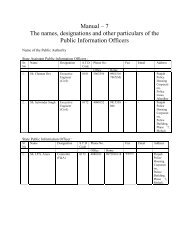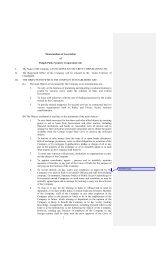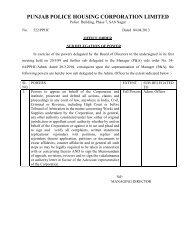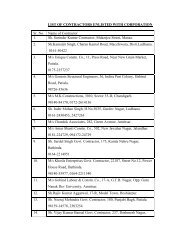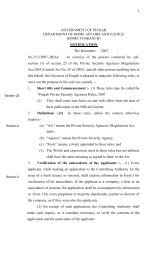The Private Security Agencies (Regulation) Act, 20051 - Kerala Police
The Private Security Agencies (Regulation) Act, 20051 - Kerala Police
The Private Security Agencies (Regulation) Act, 20051 - Kerala Police
You also want an ePaper? Increase the reach of your titles
YUMPU automatically turns print PDFs into web optimized ePapers that Google loves.
(2) <strong>The</strong> Controlling Authority shall pass an order on application for renewal of licencewithin thirty days from the date of receipt of application complete in all respects.(3) On receipt of an application under sub-section (1), the Controlling Authority may,after making such inquiries as he considers necessary and by order in writing, renew thelicence or refuse to renew the same :Provided that no order of refusal shall be made except after giving the applicant areasonable opportunity of being heard.9. Conditions for commencement of operation and engagement of supervisors.—(1)Every private security agency shall, within six months of obtaining the licence, commence itsactivities.(2) Every private security agency shall ensure imparting of such training and skills to itsprivate security guards and supervisors as may be prescribed :Provided that the person carrying on the business of private security agency, before thecommencement of this <strong>Act</strong>, shall ensure the required training to its security guards andsupervisors within a period of one year from the date of such commencement.(3) Every private security agency shall, within sixty days from the date of issue of thelicence, employ such number of supervisors, as may be prescribed.(4) A private security agency shall not employ or engage a person as a supervisor unlesshe fulfils the conditions specified in sub-section (1) of Section 10.(5) While engaging a supervisor of private security guards, every private securityagency shall give preference to a person who has experience of serving in the Army, Navy,Air Force or any other Armed forces of the Union or State <strong>Police</strong> including armedconstabularies and Home Guards for a period of not less than three years.10. Eligibility to be a private security guard.—(1) A private security agency shall notemploy or engage any person as a private security guard unless he—(a)(b)(c)(d)(e)(f)is a citizen of India or a citizen of such other country as the Central Governmentmay, by notification in the Official Gazette, specify;has completed eighteen years of age but has not attained the age of sixty-fiveyears;satisfies the agency about his character and antecedents in such manner as maybe prescribed;has completed the prescribed security training successfully;fulfils such physical standards as may be prescribed; andsatisfies such other conditions as may be prescribed.(2) No person who has been convicted by a competent court or who has been dismissedor removed on grounds of misconduct or moral turpitude while serving in any of the armedforces of the Union, State <strong>Police</strong> Organisations, Central or State Governments or in anyprivate security agency shall be employed or engaged as a private security guard or asupervisor.(3) Every private security agency may, while employing a person as a private securityguard, give preference to a person who has served as a member in one or more of thefollowing, namely:—(i)(ii)(iii)Army;Navy;Air Force;
(iv)(v)(vi)any other armed forces of the Union;<strong>Police</strong>, including armed constabularies of States; andHome Guards.11. Conditions of licence.—(1) <strong>The</strong> State Government may frame rules to prescribe theconditions on which licence shall be granted under this <strong>Act</strong> and such conditions shall includerequirements as to the training which the licensee is to undergo, details of the person orpersons forming the agency, obligation as to the information to be provided from time to timeto the Controlling Authority regarding any change in their address, change of managementand also about any criminal charge made against them in the course of their performance ofduties of the private security agency or as the case may be, a private security guard employedor engaged by them.(2) <strong>The</strong> State Government may make provision in the rules to verify about imparting ofrequired training by the private security agency under sub-section (2) of Section 9 and toreview continuation or otherwise of licence of such private security agency which may nothave adhered to the condition of ensuring the required training.12. Licence to be exhibited.—Every private security agency shall exhibit its licence orcopy thereof in a conspicuous place of its business.13. Cancellation and suspension of licence.—(1) <strong>The</strong> Controlling Authority maycancel any licence on any one or more of the following grounds, namely:—(a)(b)(c)(d)(e)(f)(g)(h)(i)(j)(k)that the licence has been obtained on misrepresentation or suppression ofmaterial facts;that the licence holder has used false documents or photographs;that the licence holder has violated the provisions of this <strong>Act</strong> or the rules madethereunder or any of the conditions of the licence;that the licence holder has misused information obtained by him during thedischarge of his duties as the private security agency to any industrial orbusiness undertaking or a company or any other person;that the licence holder by using any letter-head, advertisement or any otherprinted matter or in any other manner represented that the private securityagency is an instrumentality of the Government or such agency is or has beenusing a name different from that for which licence has been granted;that the licence holder is or has been impersonating or permitting or aiding orabetting any body to impersonate as a public servant;that the private security agency had failed to commence its activities or toengage a supervisor within the specified time period;that the licence holder is or has wilfully failed or refused to render the servicesagreed to any person;that the licence holder has done any act which is in violation of a court order oran order of a lawful authority or is or has been advising, encouraging or assistingany person to violate any such order;that the licence holder has violated the provisions of the <strong>Act</strong>s given in theSchedule which may be modified by the Central Government, by notification inthe Official Gazette;that there have been repeated instances when the private security guard or guardsprovided by the private security agency—
(l)(i)(ii)(iii)(iv)(v)failed to provide private security or were guilty of gross negligence in notproviding such security;committed a breach of trust or misappropriated the property or a partthereof which they were supposed to protect;were found habitually drunk or indisciplined;were found to be involved in committing crimes; orhad connived or abetted a crime against the person or property placedunder their charge; orthat the licence holder has done any act which poses a threat to national security,or did not provide assistance to the police or other authority in the discharge ofits duties or acted in a manner prejudicial to national security or public order orlaw and order.(2) Where the Controlling Authority, for reasons to be recorded in writing, is satisfiedthat pending the question of cancelling of licence on any of the grounds mentioned in subsection(1), it is necessary to do so, that Controlling Authority may, by order in writing,suspend the operation of the licence for such period not exceeding thirty days as may bespecified in the order and require the licence holder to show cause, within fifteen days fromthe date of issue of such order, as to why the suspension of the licence should not be extendedtill the determination of the question of cancellation.(3) Every order of suspending or cancelling of a licence shall be in writing and shallspecify the reasons for such suspension or cancellation and a copy thereof shall becommunicated to the person affected.(4) No order of cancellation of licence under sub-section (1) shall be made unless theperson concerned has been given a reasonable opportunity of being heard.14. Appeals.—(1) Any person aggrieved by an order of the Controlling Authorityrefusing the licence under sub-section (4) of Section 7 or renewal under sub-section (3) ofSection 8 or order of suspension of licence under sub-section (2) of Section 13 or cancellationof licence under sub-section (1) of that section, may prefer an appeal against that order to theHome Secretary of the State Government within a period of sixty days of the date of suchorder :Provided that an appeal may be admitted after the expiry of the said period of sixty daysif the appellant satisfies the State Government that he has sufficient cause for not preferringthe appeal within that period.(2) Every appeal under sub-section (1) shall be made in such form as may be prescribedand shall be accompanied by a copy of the order appealed against.(3) Before disposing of an appeal, the State Government shall give the appellant areasonable opportunity of being heard.15. Register to be maintained by a private security agency.—(1) Every privatesecurity agency shall maintain a register containing—(a)(b)(c)(d)the names and addresses of the persons managing the private security agency;the names, addresses, photographs and salaries of the private security guards andsupervisors under its control;the names and addresses of the persons whom it had provided private securityguards or services; andsuch other particulars as may be prescribed.
(2) <strong>The</strong> Controlling Authority may call for such information as it considers necessaryfrom any private security agency, supervisor or private security guard to ensure duecompliance of the <strong>Act</strong>.16. Inspection of licence, etc.—<strong>The</strong> Controlling Authority or any other officerauthorised by it in this behalf may at any reasonable time, enter the premises of the privatesecurity agency and inspect and examine the place of business, the records, accounts andother documents connected with the licence and may take copy of any document.17. Issue of photo identity card.—(1) Every private security guard shall be issued aphoto identity card, by the private security agency employing or engaging the guard.(2) <strong>The</strong> photo identity card under sub-section (1) shall be issued in such form as may beprescribed.(3) Every private security guard or supervisor shall carry on his person the photoidentity card issued under sub-section (1) and shall produce it on demand for inspection bythe Controlling Authority or any other officer authorised by it in this behalf.18. Disclosure of information to unauthorised person.—(1) Any person who may beor has been employed or engaged as a private security guard by the private security agencyshall not divulge to anyone other than the employer, or in such manner and to such person asthe employer directs, any information acquired by him during such employment with respectto the work which he has been assigned by such employer, except such disclosure as may berequired under this <strong>Act</strong> or in connection with any inquiry or investigation by the police or asmay be required by an authority or process of law.(2) All private security guards of a private security agency shall render necessaryassistance to the police or to such authority in the process of any investigation pertaining tothe activities of that agency.(3) If violation of any law is noticed by any private security guard during the course ofdischarge of his duties, he shall bring it to the notice of his superior, who in turn shall informthe police either through his employer or agency or on his own.19. Delegation.—<strong>The</strong> State Government may, by notification, direct that any power orfunction (except the powers to make rules under Section 25)—(a)(b)which may be exercised or performed by it, orwhich may be exercised or performed by the Controlling Authority,under this <strong>Act</strong>, may, in relation to such matter and subject to such conditions, if any, as maybe specified in the notification, be also exercised or performed by such officer or authoritysubordinate to the Government or officer subordinate to the Controlling Authority, as may bespecified in such notification.20. Punishment for contravention of certain provisions.—(1) Any person whocontravenes the provisions of Section 4 shall be punishable with imprisonment for a termwhich may extend to one year, or with fine which may extend to twenty-five thousand rupees,or with both.(2) Any person or private security agency who contravenes the provisions of Sections 9,10 and 12 of the <strong>Act</strong>, shall be punishable with a fine which may extend to twenty-fivethousand rupees, in addition to suspension or cancellation of the licence.21. Penalty for unauthorised use of certain uniforms.—If any private security guardor supervisor wears the uniform of the Army, Air Force, Navy or any other armed forces ofthe Union or <strong>Police</strong> or any dress having the appearance or bearing any of the distinctive marksof that uniform, he and the proprietor of the private security agency shall be punishable withimprisonment for a term which may extend to one year or with fine which may extend to fivethousand rupees, or with both.
22. Offences by companies.—(1) Where an offence under this <strong>Act</strong> has been committedby a company, every person who at the time the offence was committed was in charge of, andwas responsible to, the company for the conduct of the business of the company as well as thecompany, shall be deemed to be guilty of the offence and shall be liable to be proceededagainst and punished accordingly :Provided that nothing contained in this sub-section shall render any such person liableto any punishment, if he proves that the offence was committed without his knowledge or thathe had exercised all due diligence to prevent the commission of such offence.(2) Notwithstanding anything contained in sub-section (1), where any offence under this<strong>Act</strong> has been committed by a company and it is proved that the offence has been committedwith the consent or connivance of, or is attributable to, any neglect on the part of any director,manager, secretary or other officer of the company, such director, manager, secretary or otherofficer shall be deemed to be guilty of that offence and shall be liable to be proceeded againstand punished accordingly.Explanation.—For the purposes of this section—(a)“company” means any body corporate and includes a firm or other association ofindividuals; and(b) “director”, in relation to a firm, means a partner in the firm.23. Indemnity.—No suit, prosecution or other legal proceeding shall lie against theControlling Authority or any other officer authorised by it in respect of anything in good faithdone or intended to be done under this <strong>Act</strong>.24. Framing of model rules for adoption by States.—<strong>The</strong> Central Government mayframe model rules in respect of all or any of the matters with respect to which the StateGovernment may make rules under this <strong>Act</strong>, and where any such model rules have beenframed the State Government shall, while making any rules in respect of that matter underSection 25, so far as is practicable, conform to such model rules.25. Power of State Government to make rules.—(1) <strong>The</strong> State Government may, bynotification, make rules for carrying out the provisions of this <strong>Act</strong>.(2) In particular, and without prejudice to the generality of the foregoing power, suchrules may provide for all or any of the following matters, namely:—(a)the procedure for verification of character and antecedents under clause (c) ofsub-section (1) of Section 10; the type of training under clause (d) of subsection(1) of Section 10; the physical standard under clause (e) of subsection(1) of Section 10; and other conditions under clause (f) of sub-section (1)of Section 10;(b) the number of supervisors to be employed under sub-section (3) of Section 9;(c) the form of an application for grant of licence under sub-section (1) of Section 7;(d) the form in which the licence to be granted under sub-section (4) of Section 7and conditions subject to which such licence to be granted under Section 11;(e)(f)the form of an application for renewal of licence under sub-section (1) ofSection 8;the form under sub-section (2) of Section 14 for preferring an appeal;(g) particulars to be maintained in a register under sub-section (1) of Section 15;(h)(i)the form in which photo identity card under sub-section (2) of Section 17 beissued;any other matter which is required to be, or may be, prescribed.
(3) Every rule made by the State Government under this section shall be laid, as soon asmay be after it is made, before each House of the State Legislature where it consists of twoHouses, or where such Legislature consists of one House, before that House.(4) In respect of Union territories, every rule made to carry out the provisions of the <strong>Act</strong>shall be laid before each House of Parliament and where there exists a Legislative Assembly,before that Assembly.(1) <strong>The</strong> Payment of Wages <strong>Act</strong>, 1936 (4 of 1936).THE SCHEDULE[See Section 13(1)(j)](2) <strong>The</strong> Industrial Disputes <strong>Act</strong>, 1947 (14 of 1947).(3) <strong>The</strong> Minimum Wages <strong>Act</strong>, 1948 (11 of 1948).(4) <strong>The</strong> Employees’ Provident Funds and Miscellaneous Provisions <strong>Act</strong>, 1952 (19 of 1952).(5) <strong>The</strong> Payment of Bonus <strong>Act</strong>, 1965 (21 of 1965).(6) <strong>The</strong> Contract Labour (<strong>Regulation</strong> and Abolition) <strong>Act</strong>, 1970 (37 of 1970).(7) <strong>The</strong> Payment of Gratuity <strong>Act</strong>, 1972 (39 of 1972).(8) <strong>The</strong> Equal Remuneration <strong>Act</strong>, 1976 (25 of 1976).(9) <strong>The</strong> Inter-State Migrant Workmen (<strong>Regulation</strong> of Employment and Conditions of Service) <strong>Act</strong>, 1979(30 of 1979).———


